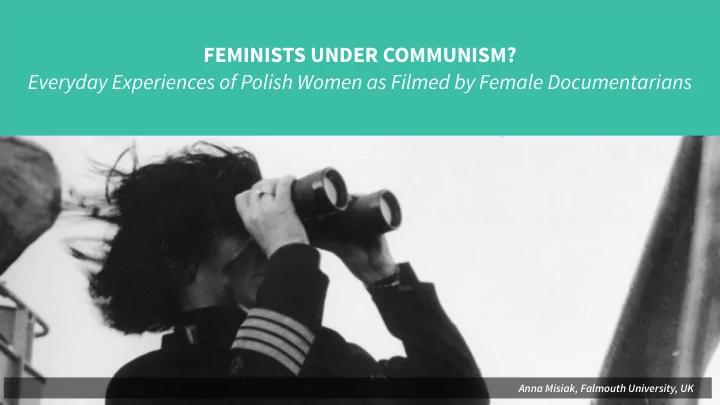

FEMINISTS UNDER COMMUNISM? Everyday Experiences of Polish Women as Filmed by Female Documentarians Anna Misiak, Falmouth University, UK
THE PROJECT • The Leverhulme Trust Fellowship 2015 • The National Film Archive in Warsaw Poland • The Documentary Film Studio (Documentary Films vs. Newsreels)
Danuta Halladin Maria Kwiatkowska Krystyna Grycze ł owska (1930-1987) (1926-1999) (1931-2009) Irena Kamie ń ska Helena Amirad ż ibi (1932-2017) (1928-2016)
WOMEN’S DOCUMENTARY FILMS IN POLAND An Overview • Female contribution to the Polish School of Documentary (1950s-1970s) • Domestic and international festival trophies • Non-political authorial visions • Variety of documentary styles Diverse experiences of men & women • Films focussed on women from the late 1950s • Limited visibility in film history at home & abroad • Resisting the o ff icial version of gender equality
OFFICIAL FILM RECORDS OF GENDER EQUALITY Newsreels Men Don’t Know About It (1957) dir. Jerzy Kaden
THE DIFFERENT HISTORY OF WOMEN UNDER COMMUNISM The Female Perspective • Women on tractors (The laughing stock) • Double burden of work • Communism in the Catholic patriarchal society • Feminism dubbed ‘unnecessary’ • Legal equality (o ff icial) • Female complaints as ‘not serious’ • Gender identity fixed on biology (traditional femininity) • Women’s heterotopia (Foucault) • Domestic matriarchy/Self-sacrificing women • Women’s survival strategies in the documentary films (and their views on that) • Job market (equal work,not career progression, up to 40 % pay gap)
DIGGING OUT: THE COMMUNIST PIONEERS OF TODAY’S FEMINISM • Distinct & di ff ering definitions of womanhood empowerment and resistance (from girl power • Female documentary filmmakers as to female sisterhood) ‘unintentional’ pioneers of contemporary feminist activists • Recognition of privilege (city vs countryside, workers vs educated women) • Legal guarantees and access to the job market don’t translate into gender equality in everyday • Varied articulations of resistance from heroism life through celebration of femininity to a rare open statement of resistance • Women’s resilience under patriarchal discrimination • Diverse versions of feminism as an emergency exit from women’s heterotopia
FILMED EVIDENCE OF WOMEN’S HETEROTOPIA Coping with the Double Burden of Work The 24 Hours of Jadwiga L. Our Friends from Ł ód ź Guarded Grade Crossing (1967) (1971) (1976) dir. Krystyna Grycze ł owska dir. Krystyna Grycze ł owska dir. Maria Kwiatkowska
FILMED EVIDENCE OF WOMEN’S HETEROTOPIA Coping with the Double Burden of Work Our Friends from Ł ód ź (1971) dir. Krystyna Grycze ł owska
FILMED EVIDENCE OF WOMEN’S HETEROTOPIA Celebrating the Self-Sacrificing Mother/Caretaker Nurses Good Morning, Children The Family (1974) (1966) (1971) dir. Krystyna Grycze ł owska dir. Irena Kamie ń ska dir. Danuta Halladin
FILMED EVIDENCE OF WOMEN’S HETEROTOPIA Coping with Social Suppression (Female Migrant Workers) Zambrów The Women’s Island They Were There Where From Where To (1968) (1985) (1987) (1962) dir. Irena Kamie ń ska dir. Danuta Halladin dir. Danuta Halladin dir. Helena Amirad ż ibi
FILMED EVIDENCE OF WOMEN’S HETEROTOPIA Coping with Social Suppression (Resilient Heroines) Fathers of A Town Workwomen Day A fu er Day (1972) (1980) (1988) dir. Danuta Halladin dir. Irena Kamie ń ska dir. Irena Kamie ń ska
FILMED EVIDENCE OF WOMEN’S HETEROTOPIA Empowerment through Fashion, Leisure & Entertainment Who Wants a Dress? Career Not Just on Fashion (1963) (1964) (1965) dir. Helena Amirad ż ibi dir. Helena Amirad ż ibi dir. Maria Kwiatkowska
FILMED EVIDENCE OF WOMEN’S HETEROTOPIA The Independent Career Woman The Girls from Nawojka Scenes with the Captain Ms Zofia (1963) (1971) (1978) dir. Maria Kwiatkowska dir. Maria Kwiatkowska dir. Maria Kwiatkowska
DOCUMENTARY EVIDENCE OF WOMEN’S HETEROTOPIA An Open Statement of Female Resistance to Patriarchy The Weak Woman (1967) dir. Helena Amirad ż ibi
THE WEBSITE http://womenundercommunism.com/
Recommend
More recommend